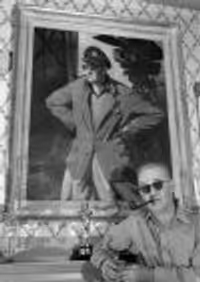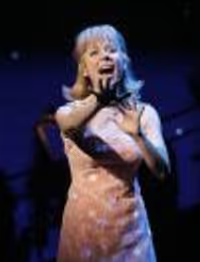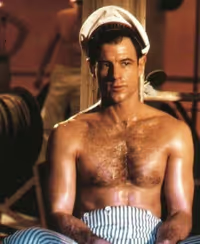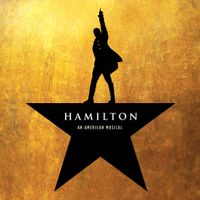12 YEARS A SLAVE
#2512 YEARS A SLAVE
Posted: 10/23/13 at 6:50pm
1. I think the Master of that house had other women, it is just that Woodard's character met him at a point in her time where she could rise to house mistress. I think she mentioned that she cannot remember the last time she was in the field. I don't think she really cares about if the Master is looking for younger slave girls, as long as her place in the house was secure. It's an effed up dynamic but African-American history and figures speaking of the 'house negroes' would point to this type of character. The sense of sacrificing so much morals/ethics/humanity for security can lead to people doing some insane things. For me, the sense of 'This feels so off' is that character and scene.
2. Agreed.
3. Well his actual history is a mystery because of how screwed up the genealogy records have made for a certain segment of the African-American population of their history. We have no date or record or cause for when he died and I am willing to believe the filmmakers were lucky to have that much on Northup post-enslavement. Based on the way the story was told, I really think while it is Solomon's experience there are these textures to his experience that inform him of the institution of slavery. I think there is a thin line when making a movie about slavery and not having a singular narrative be generalized as the experience of all slaves. Yes, Solomon has this really interesting second chapter but what I felt in the film is, 'Don't forget about Eliza. Don't forget about Patsy. Don't forget about Eliza's children.' You could make many movies about the different characters and perspectives on their slave experiences but what I think the movie does well is it maintains that Solomon is meeting these people and processing it with his own experience. Solomon is still picking up the pieces in the end and others movies would have just skipped over that release to go straight into 'Solomon's a hero' phase. So after seeing it, I am even more certain that the movie would not have really worked that way. Somebody else could make that movie, or a Harriet Tubman, or Frederick Douglass movie but it seemed clear that Ridley and McQueen were set on a movie about slavery through this story.
4. From an aesthete point of view of those scenes, the wide shots and long takes make for a potent punch. In one sense the movie rarely gives gets up close when the worst things are happening but at the same time those moments feel so isolated in its distance because it is just an everyday horror. We see what happened to Patsy after she was whipped in addition to her breakdown as a person who wants to die or catatonically checks out when she is raped. For me the rape and her getting chucked with the object by Paulson's character was just as upsetting because the shots really show is a helpless situation and nobody can really do anything. Interesting you think Solomon lost his humanity in that whipping scene. I just thought when he truly lied about himself when Epps cornered him about the letter or when he joins the chorus of other slaves when they bury a fellow slave showed somebody who had accepted his fate.
4. As for the Patsy/Epps dynamic it was extremely true to many slave narratives and that narrative itself. Eliza's story of her light-skinned child also touched upon this except it was a daughter disgusted by her father's behavior with a slave girl.
As for Patsy's whole story being sadistic, I think a lesser filmmaker in that throwing scene would have immediately gone to a close-up of the actress to really zero-in on the affliction of pain or would have telegraphed that scene moments and beats before it happened. For me that would have been too sadistic.
#2612 YEARS A SLAVE
Posted: 10/24/13 at 12:16am
You know what...that was such a powerful movie I'm returning to see it again tomorrow on the big screen which is a rarity for me. It was what I was hoping ALEX HALEY'S QUEEN tv miniseries would have been in the early 90s.
I was fortunate to have a great-grandma live until I was 14. Her step-father was born a slave but her mom free due her grandma being released via manumission. When I was around 11, I naively asked her why she was so light-skinned compared to the rest of the family, including me. That was when I learned two long-held family secrets. Her mom was raped by the son of her family's last master and one of her brothers was lynched as a result of an altercation with a couple of teen-aged white guys when she was a child. That was before she bore my grand-dad at 14 to her husband who was around 30 at the time.
I harbor no resentment toward whites with whom I grew up back in rural NC. But, a few are absolutely in denial about the origin of the huge swaths of land that are still held by their families. My dad and uncles were homebuilders during my youth which covered the mid-60s/early-70s. Many of those landowners were still reluctant to sell tracts of land anywhere within proximity of their homes to non-whites. However, now that those family farmers can longer compete with Cargill and Monsanto, they're selling tracts to any and all offerers. A friend of mine from high school, who inherited a sizable estate from his parents, admitted to me last year that his wife and he opted to unload those holdings the first chance they got because they simply didn't want to be associated with the stigma of the plantation system. There are boatloads of blacks back home who still bear his family's surname and not by blood.
Back to the film, my only remaining nit is that Solomon bowed the violin with both left and right hands throughout depending on how he was positioned in the frame relative to the other actors. I got why it happened but it was so obvious to me at least.
#2712 YEARS A SLAVE
Posted: 10/24/13 at 9:41am
I thought this was a remarkable film- in pretty much every way. Every leading performance (with the exception of Brad Pitt, whose role is under-written though necessary and whose presence was for me altogether distracting) is perfectly drawn. Alfre Woodard's one scene is one of the best scenes I can think of from a modern film and a quick but virtuoso moment from this remarkable actress. I felt burned after that scene.
Fassbender's performance is so lived-in and complete that you almost forget that he's meant to be your villain. He's a human being- you never forget that- and it makes the tale so much more difficult to watch. Sarah Paulson is dynamite. I also can't see her making it into the Oscar shortlist, but it's a stellar performance from an actress who has been making such an impact as of late.
Dano, Cumberbatch and Giamatti are spot-on in their small roles. Whoever played Cumberbatch's wife is also graced with the honor of delivering the film's most INSANELY ACIDIC/DISGUSTING/UPSETTING/ABSURD/TRUTHFUL line of dialogue (I won't spoil) and she does it perfectly.
Chiwetel Ejiofor and Lupita Nyong'o are so DAMN good and will deservedly show up on every nominee's list this season. Having not seen all films for the year, I can't make any predictions- but these are both Oscar worthy performances.
The funeral song scene was absolutely riveting and will make a rather perfect clip for Eljiofor as they call out the nominations at the Oscars.
I will say that I was underwhelmed by Kelsey Scott, who plays Solomon's wife. Those earlier scenes were the least effective, and I would have loved a more lived-in connection between Solomon and his wife. A very minor quibble.
The score never felt wrong to me, though I do see that, of all the film's artistic elements, it is the most emotionally manipulative.
McQueen has made a great film. A phenomenal film. Don't go see this if you plan to do much afterward. It will stay with you.
#2812 YEARS A SLAVE
Posted: 10/24/13 at 9:39pm
Wesley Morris' piece about the movie and movies about race in general is one of my favorite pieces of cultural/film criticism this year. This is why I am perplexed at this supposed feeling that there are a lot of other slave movies. The ones that are considered 'typical' on race and Hollywood, in fact, are quite transgressive:
The cultural crater of 12 Years a Slave
#2912 YEARS A SLAVE
Posted: 10/24/13 at 9:59pmIt also must be said: The great thing about 12 YEARS A SLAVE is that it's not trying to be an Oscar movie (i.e. THE HELP, BELOVED, THE BUTLER, etc.)
#3012 YEARS A SLAVE
Posted: 10/26/13 at 8:36pmI went to see this movie today and agree with everything that has been said in this post. This is an amazing movie and very intense. I haven't stopped thinking about it all day. I hope it is remembered at Oscar time.
#3112 YEARS A SLAVE
Posted: 10/28/13 at 11:52am
I am going to be in minority here because I did not love this movie. I feel like I saw a completely different film than the rest of you. I found it to be extremely tedious and disturbing. There was no subtilty about it and I felt like I was being beat over the head with the brutality of slavery. I felt nauseous at times. Perhaps that was the intended effect. I felt every one of those 12 years. The final whipping scene absolutely did me in. I could not even watch it. I put my face in my hands and waited for it to be over. It felt like an eternity. I had had enough by that point.
This movie is a brutal depiction of slavery and not for faint of heart.
Roscoe
Broadway Legend Joined: 5/15/03
#3212 YEARS A SLAVE
Posted: 10/28/13 at 2:00pmI haven't seen the movie yet, and I guess I'll get around to it, but I'm not reading or hearing anything that really makes me particularly interested in it. I found the director's previous film, SHAME, a tedious little batch of Addiction cliches, complete with Tearful Catharsis In The Rain, and I'm concerned that this film will be no different -- is there more to this movie than a lot of preaching to choir about how Slavery Is Bad?
#3312 YEARS A SLAVE
Posted: 10/28/13 at 3:56pm
Roscoe, as somebody pretty mixed on Shame, I thought this was more with McQueen's first full-length feature, Hunger (which I think is a real masterpiece), and even in that case the artistic flourishes are pretty spare in my opinion. Yes there are long-takes and wide-shots and some close-ups but I think Sean Bobbitt's cinematography was as equally impressive as Lubezki in Gravity because while looking beautiful (how was he supposed to shoot it?) it never felt like it had the flourishes of 'Beauty first, story second'. I also just think McQueen is somebody who needs a good screenwriter/writer with him. Enda Walsh and John Ridley, writers for Hunger and 12 Years A Slave, seemed to have some understanding of their material (Walsh moreso than Ridley because I think he did not quite stick the landing with some of the period, straight for the narrative text dialogue) as opposed to Abi Morgan who did not seem to grasp exactly what her material was.
I think it goes beyond slavery is bad, others can disagree. This is about a person who feels so removed from the experience and institution of slavery and it it is about him staying alive and trying to figure out the ways to not completely break down from this experience whether trying to be exceptional, be detached, or be isolated from everybody else while also him being a prism for observing the institution and experience and those within it.
I strongly suggest everybody read the Morris piece on why the movie is different beyond the reaction of 'We already watched Roots'.
Also, maybe this speaks to my cinematic threshold but I'd rather re-watch this than almost any movie in the Haneke filmography and I think Haneke's movies are great. I just don't think it crossed a line for me on my cinematic threshold.
Roscoe
Broadway Legend Joined: 5/15/03
#3412 YEARS A SLAVE
Posted: 10/28/13 at 4:27pmThanks for the words, SG.
#3512 YEARS A SLAVE
Posted: 10/29/13 at 7:21pmI found the pacing problematic, as well as some of the story-telling (like the ink that doesn't work, and that he then knocks over in anger, but then somehow he has ink again and is able to write with it anyway...? Are we to assume that he had an inexhaustible supply of berries? And who was the random woman who tried to seduce him, but who never appeared in any other scene?). Great acting and truly powerful material in some scenes, but the film didn't live up to the hype for me.
#3612 YEARS A SLAVE
Posted: 10/29/13 at 8:32pm
SPOILERS
"And who was the random woman who tried to seduce him, but who never appeared in any other scene?"
She's on the plantation that he is basically on loan to, IIRC. I think it it reasonable to assume that he never saw her again after he rejected her advances. And the movie is pretty much dictated in Solomon's point of view, so it does not surprise me that with the exception of that moment with Patsey and Epps, that the movie is almost entirely revolving around his experience and observations.
As far as the berries as ink, it really happened. Solomon Northup was not an anomaly on making berries into ink. Some slaves even circumvented their own paper to write.
#3712 YEARS A SLAVE
Posted: 11/2/13 at 8:42am
I recently read the book and loved it. I find much to admire in the movie but was largely left cold by it. Many of the characters in the book, especially many of the slaves and Bass (Pitt), are much more interesting and cinematic and have many character-developing moments that I longed to see in the movie and was disappointed to see given short change. The script brings to life the story of Eliza (strong work from Adepero Oduye) but left out Uncle Abram (Dwight Henry), one of the story's most interesting characters, almost entirely. We see him being buried but never knew the man. Bass is a much more interesting character than the script makes him out and has a heartbreaking scene near the end where he is found by those searching for Solomon that I was surprised, and yet not, to see omitted. I was also surprised to see Solomon's major effort at escape left out, was confused by the early sex scene (who was that? a hallucination of Ann?), and found the final homecoming scene detached and odd. And I found the plausible deniability of Ford's knowledge that Platt was kidnapped odd; much more effective in the novel that Solomon is too afraid to ever bridge the subject after his beatings.
McQueen, in his zeal to make the movie unsentimental, has left out a great deal of the story that gave it heart and character. No doubt this was deliberate and in many ways effective but for me had an antiseptic, dispassionate result.
#3812 YEARS A SLAVE
Posted: 11/10/13 at 2:07am
Just saw this. I'm with Tom. I thought it was extremely gruesome and brutal just to show how bad slavery was. The whole movie felt like a blood bath with no other intention but to show the violence of slavery. The story and pacing were a mess in my opinion.
Overall I really did not care for this film at all.
#3912 YEARS A SLAVE
Posted: 11/10/13 at 4:00pmBy the way, the book, which has so much more heart than the movie, has even more brutality - far more!
#4012 YEARS A SLAVE
Posted: 11/10/13 at 4:58pm
The performance that has stayed with me long after I saw the film is Sarah Paulson's. Whereas Fassbender is all tics and grunts and Oscar bait, Paulson gave the truly terrifying and authentic portrait of the slave-trade class.
I have problems with the film overall that I'm still working out.
#4112 YEARS A SLAVE
Posted: 11/10/13 at 5:00pm
The reviews aren't making me want to see it either. Nothing that has been said so far says anything to me other than "shock factor."
If you need to see the torture of slavery in front of you to make you understand what happened and to make you cry about it, fine. Heavy-handed teaching suits some people. I don't need it or want it. I already get it. I don't have to bathe in it and feel every lash of the whip and every drop of blood spilled to feel "devastation."
I'm not into that kind of storytelling.
blocked: logan2, Diamonds3, Hamilton22
#4212 YEARS A SLAVE
Posted: 11/10/13 at 5:04pm
McQueen, in his zeal to make the movie unsentimental, has left out a great deal of the story that gave it heart and character. No doubt this was deliberate and in many ways effective but for me had an antiseptic, dispassionate result.
This has been McQueen's MO his entire career. He fetishizes the act he's depicting, and cares nothing for the people involved. Slavery in this film simply replaces sex/power in SHAME or hunger strike/political prisonership in HUNGER.
It's a deeply flawed film, and much of the response to it has conflated brutality with profundity.
#4312 YEARS A SLAVE
Posted: 11/10/13 at 5:31pm
I feel like I am not seeing brutality to the point people are deeming it a blood-bath. The scenes of bloodshed are so impacting because of how far and few between we get those moments of seeing it. I don't see the fetishsizing of it (And I especially don't think Hunger was guilty of fetishsizing what happened in its story either), especially a year removed from Django Unchained where we get man killed by dogs and Mandingo fights. We see Solomon whipped but we don't see his back- we just see him lift up his shirt that is tattered and bloodied. We see Patsy's whips because of Solomon's involvement in the act. There is a Kubrickian touch of removal in some respects but to me Solomon is the prism of which we see the brutality so there is a touch of where the acts of infliction and the way people act in the system of slavery is rendered surreal. It was his artistic intention. It worked for me, it didn't work for others.
For me since seeing it, I have dropped a little of my qualms with certain things, namely the score. I really think calling it brutal does not do favors for promoting the film. To me there is fascinating exploration of gender roles for the period and of women and color specifically that to me you almost never see get that cinematic treatment. I would say McQueen drops the pretense of the movie of it being Solomon's story just to portray Patsy's interactions with Epps which to me works. Thus far, it is definitely worthy of the nominations it will be nominated for and I certainly think it is stronger than its main competition like Gravity and Captain Phillips.
#4412 YEARS A SLAVE
Posted: 11/10/13 at 6:01pm
The violence of DJANGO and the violence of this film are not comparable. DJANGO's violence, while graphic, is often as comic and genre-conscious as it is brutal; the violence of 12 YEARS A SLAVE, whether explicitly shown (Solomon's beating) or not (Patsey's beating) are brutal for its own sake. I left the film feeling that it adds nothing new to the conversation, and, to pick up Besty's salient point, the explicit violence of the film isn't something that I need to see to understand.
The film is better in many ways than McQueen's previous films, but I'm not convinced that he actually knows how to make a narrative film. He is still a visual artist, first and foremost, and that shows in how he tells his stories.
#4512 YEARS A SLAVE
Posted: 11/10/13 at 6:18pm
The violence in Django Unchained is really only comic when it is white people, basically the villains of the film, getting that infliction. Although it is not Tarantino's strongest (it is honestly my least favorite film he has done), he does seem to somewhat get what violence should be played off as serious versus comic rather consistently throughout his career.
As for adding anything new to the conversation. Hmm.... Was it ever intended to do that? Was it to teach a lesson? I think McQueen and Ridley understood this is not an average slave narrative. McQueen recently described reading the book as like "reading science fiction," or something by the Brothers Grimm or a fairy tale like "Pinocchio". It is heavily aestheticized because he is a visual artist, he even had Ejiofor study silent film stars to give you an idea of what he wanted from that performance. Again I really don't mind it. The choices of long-takes and close-ups to me work to tremendous effect.
Now this is not going to do do the movie any favors with this comparison but the talk of violence reminds me of when I finally saw The Texas Chainsaw Massacre. Despite its reputation as one of the bloodiest movies of its kind, there is actually very little gore shown. However, the constant threat, the dread, the blunt moments of brutality that are heightened by the actual rarity of the act, and the surreality of it add a texture to it that it leads so much to the imagination of it being a 'blood-bath' movie.
#4612 YEARS A SLAVE
Posted: 11/10/13 at 8:25pm
As for adding anything new to the conversation. Hmm.... Was it ever intended to do that? Was it to teach a lesson?
Well, on its most basic level, it SHOULD be adding something new to the filmic conversation about slavery. There have been few, if any, cinematic representations of free blacks who were enslaved under dubious circumstances, which was much more common than many people realize. At the same time, the hyperbolically enthusiastic response ("this is the DEFINITIVE film on slavery!") should make anyone question why this film, why this story. Nothing about the film merits that response, to me, and it sometimes feels comically overwrought. But you never know what people will respond to.
#4712 YEARS A SLAVE
Posted: 11/10/13 at 9:31pm
Personally, I have been underwhelmed this year in films thus far as opposed to 2011 and 2012 that for me had a lot of films that hit me hard in terms of form and storytelling. I'd say only The Act of Killing and Frances Ha approach those others I consider the best from the last couple of years. 12 Years A Slave may or may not be in my personal top ten at the end of the year but unlike a few other contenders for awards season, I think it has a much more interesting possible staying power and not just because of aesthetics or long-takes or close-ups.
I do think there is an important perspective clearly at the hand in the film's direction. To me this is clearly about looking into the past and looking back to a world as fractured as Solomon's world. He is free in one world and in another he has no personhood, he is considered property. I mentioned that this is unique entry point into a slave narrative as opposed to a well-known historical figure as Frederick Douglass or Harriet Tubman who are born into and then escape. For me those would be completely different movies from this one and I believe McQueen and Ridley are acutely aware of that therefore present Solomon as an outsider.
I don't really care what the likes of David Denby (source of that pull-quote) say. There are plenty of films that I have liked over the years where I found even the perspective of praise toward those films to not be even close to why I liked them. I personally think movies on slavery are grossly underrepresented and I personally think this shows a very specific, very different perspective and wish there were more films on slavery to shed on how varying the perspectives are. Not because to hammer away on slavery was bad, but the varying textures of that period of American history.
#4812 YEARS A SLAVE
Posted: 11/10/13 at 11:22pm
The scenes of bloodshed are so impacting because of how far and few between we get those moments of seeing it.
Far and few between? I feel like a solid 75% of the film was slaves getting battered and beaten. That was my problem with it. I personally got nothing out this film besides an explicit and graphic view of the brutalities of slavery. I can understand a few graphic scenes here and there, but this was just jam packed with one blood bath of a scene after another. I think they should have spent more time developing the stories and characters.
#4912 YEARS A SLAVE
Posted: 11/10/13 at 11:37pmWe see a stabbing, we see hangings, we see Patsy's whipped wounds in her scene, we see Solomon hung, we never get a close-up of Patsy's injury from the object thrown at her, we see Epps' assault on Patsy, and we see Solomon's shirt after his whipped scene. Where else did you find there to be a blood bath? When I hear that phrase characterized as dominating an entire movie, I tend to have specific visuals that I personally did not identify with this movie as. You can call it brutal but it is not a blood bath.
Videos












